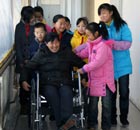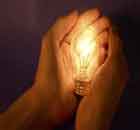-
-
China Daily E-paper
Web Comments
Control firecrackers, protect civil right
By Zhang Xi (Chinadaily.com.cn)
Updated: 2010-02-24 15:39
 |
Large Medium Small |
The gaiety of the Spring Festival is welcome, but not the air and noise pollution. The celebration of the Lunar New Year is cherished, but not at the expense of others. Our right to a clean and quiet environment is always violated by fireworks during the festival.
Take my neighborhood in Beijing for example. At the eve of this Lunar New Year, I was scared to hear bomb-like sounds and got upset to see burn marks on my windows, although I live on the 11th floor. I felt that I'm living in a city at war, with the flames lighting up the dark sky, explosions all around and pungent smoke rising.
The danger and loss caused by fireworks are illustrated by the infamous multi-billion-yuan fire at the China Central Television (CCTV) building last year, and the number of people injured by firecrackers. Tons of unwanted debris, such as paper scraps, cellophane and plastic wrappers left behind by firecrackers, add up to mountains of holiday trash. It seems environmental protection laws and other relative regulations automatically expire during the 14-day New Year and Lanterns festivals.
In 2005, the municipal government lifted its 13-year ban on fireworks within the Fifth Ring Road. From then on, firecrackers were allowed all day from New Year's Eve to New Year's Day, and from 7am to 12pm during the rest of 13 days, even in the busy central business district.
The government wanted to respect people's desire to celebrate the Spring Festival in a traditional way. But when I saw powerful fireworks in big boxes blast near my building or on the road despite passing cars, tradition didn't look so good. It looked like some people weren't as interested in celebrating the festival as they were in making big explosions.
So I want to ask, does the government also need to respect the desire of people who want to enjoy a quiet environment? Some argued that the ban on firecrackers isn't good to maintain the festival atmosphere, but they forget that according to the ban, they're supposed to set off them outside central Beijing. If that were enforced, both groups' rights would be protected.
I don't understand why people must light up firecrackers, especially strong ones, near residential buildings that might house babies and children, sick neighbors, elders and pets. Where are their rights when the firecrackers are lit up?
The other reason to lift the ban was the lack of police officers. But I doubt they strictly enforced the law anyway. Most officers simply stopped those who broke the rule rather than fine them because they didn't want to "ruin" the happy festival atmosphere. As soon as police left, firecrackers went off again. That's why setting off fireworks under others' windows, near cars and on the sidewalk wasn't forbidden until now.
Our government has the ability to display fireworks shows just like those for the Olympics opening ceremony and National Day. Why can't it organize such activities at appointed sites for the Spring Festival? And as for those who really want to light up firecrackers by themselves, they can go to certain open places far away from residential buildings. Many people, including me, would be happy to view the festival atmosphere produced by firecrackers – but from a distance.









